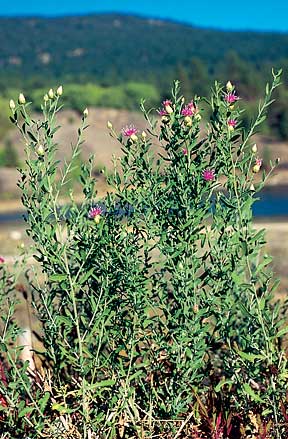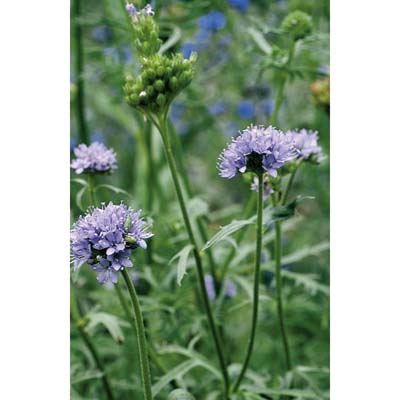Introduced species: Russian knapweed (Leuzea repens; also listed as Acroptilon repens, Rhaponticum repens or Centaurea repens)
Characteristics: Russian knapweed is a perennial with branched, erect stems up to 1.3 meters (4 feet) tall, covered in white hairs. Leaves are up to 15 cm (6 in) long near the base of the plant, entire to few-toothed, and are smaller toward the top of the plant. The flower heads are about 1 cm (½ in) in diameter and are borne on branch tips from June through September. The cone-shaped flowers may be white or pink to lavender-blue. Greenish to straw-colored bracts are tipped with a papery, pointed margin. Ivory-colored seeds are tipped by plumes that fall off at maturity. Roots are dark brown to black.
Spread: Russian knapweed spreads both by seed and from shoots arising from creeping roots. It can produce up to 27 root shoots/ sq ft, and roots may grow to a depth of 23 feet. Each plant may produce up to 1200 seeds. Native to the Caucasus in southern Russia and western Asia, it was introduced as a contaminant in feed for livestock, and is now widespread in the central and western United States. In addition to crowding out native plants through prolific reproduction, Russian knapweed produces chemicals that inhibit the growth of other plant species. It is also poisonous to horses.
Control: Early control is critical for this species, owing to its rapid underground growth. Manually dig up young plants in the spring or early summer while the ground is moist; be sure to get the entire root/rhizome system. Cut off and bag any flowers to prevent seeding. Mowing is not effective. Established stands will likely require several years of treatment; judicious use of appropriate herbicides can be effective on larger patches.
Native Replacement: Bluehead gilia (Gilia capitata) is a native wildflower species with attractive clusters of blue flowers blooming in early summer. It may function as an annual or perennial depending on conditions, and will grow nicely in a variety of habitats, including rocky soils.


